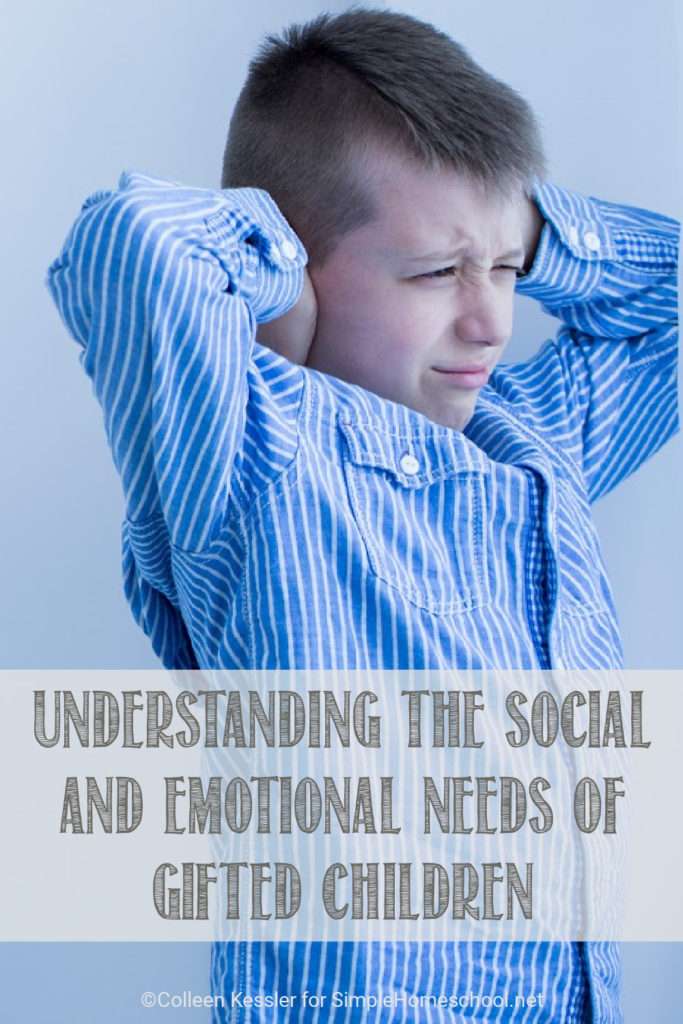Understanding the Social and Emotional Needs of Gifted Children ~
Written by Colleen Kessler
Gifted children have characteristics that can often cause them to struggle socially and emotionally. In fact, academic challenges are often much easier to deal with than emotional ones.
To give your gifted child the support he or she needs to be successful, it’s important that you understand how that giftedness impacts his or her emotions.
So, what are some of these challenges?
Asynchronous Development
Simply put, asynchronous development means that gifted children grow physically, emotionally, and intellectually at varying rates. This discrepancy can cause some challenges. A gifted child may have visions of how he or she wants a project to turn out, but lacks the motor skills or physical ability to complete his or her vision.
Gifted children may understand abstract concepts like death and war, but often can’t deal with the emotional ramifications of that understanding. They may experience fear and anxiety that can be debilitating.
One minute your gifted eight-year-old may be having a passionate debate with another adult, defending human rights with strong, research-based arguments, and the next minute he’s hitting his sister because he saw her playing with one of his toys.
Advanced Reasoning & Verbal Ability
While it may seem cute and even amazing when your eighteen-month-old rolls out paragraphs instead of two- and three-word sentences, this skill may be used against you when that sweetheart gets a bit older.
Advanced verbal ability can make gifted kids be argumentative. In fact, many argue about every little thing that happens in their day. It can completely exhaust both the parent and the child.
Gifted kids can try to manipulate parents and other adults, or attempt to “pull one over” on them from young ages. A gifted child’s advanced sense of humor can get them into trouble with adults or cause them to be misunderstood, making it difficult to get along with people.

Intensity
Gifted children often struggle with emotional intensity and perfectionism. They fear failure and react in unusually intense ways when they don’t get their way or are disappointed.
Sometimes perfectionism can be paralyzing to a gifted child, keeping them from trying something new for fear of failing at it.
Gifted children may hold back in situations, waiting to assess all implications before acting, which can make them seem socially inept or shy. Intensity can manifest itself in extreme outbursts toward others — especially in situations that do not normally warrant strong reactions. Extreme sensitivity can cause intense kids to take things too personally.
So what can parents do to help their gifted children deal appropriately with their social and emotional differences?
Find Intellectual Peers
It’s tough for gifted children to be around same-age peers exclusively. While most kids want to play with other children their own age, gifted children need to play with, talk with, and find mentors in older children and adults.
Use your child’s passions to help find him or her adults or other children to talk to.
Try to find other gifted kids in your area, and form a play or study group. Get your child involved in situations that make the most of his or her giftedness and where the differences don’t seem so different.
Control Your Own Reactions
Even though a gifted child wants to argue with the things you say and do, you are still the parent, and it’s important to maintain that balance. It’s okay — and even encouraged — to give your child credit for innovative and logical thinking. That’s a gift that can be beneficial to their future.
But, a child still needs proper discipline in order to learn to get along with others. It’s a challenging line to walk as parents of gifted children.
These are, admittedly, just a few ways to cope with your gifted child’s social and emotional needs. The most important thing is to be aware that your child is different and has specific needs that must be met.
As you continue your journey of homeschooling your child, you’ll be able to protect his or her gifts while continue to nurture the parts that need extra care and time to mature.
What’s Your Homeschool Mom Personality? Take Jamie’s quiz now and receive a free personality report to help you organize your homeschool based on what your personality type needs most!


